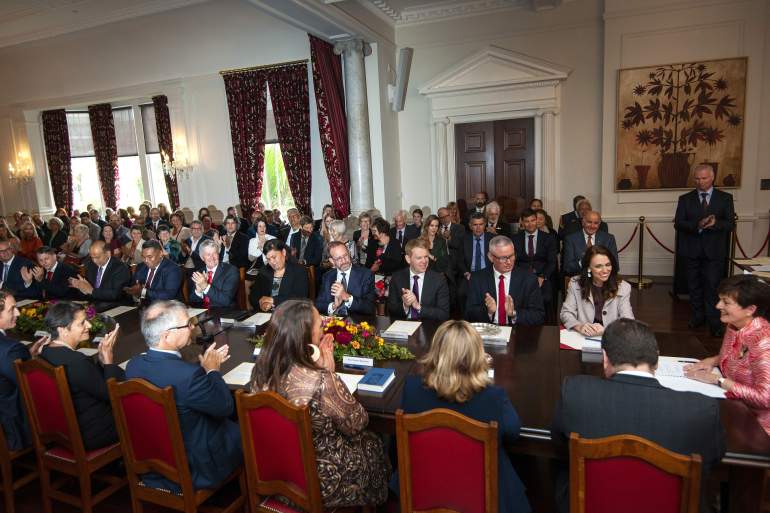New Zealand’s Ardern sworn in for second term after landslide win
Ardern says her government will prioritise fight against COVID-19 and rebuilding the economy.

New Zealand Prime Minister Jacinda Ardern was sworn in for a second term on Friday, as final election results showed her landslide victory was even bigger than previously thought.
Ardern and her ministers, who were appointed earlier this week, took their oaths of office in English and Maori during a ceremony at Wellington’s Government House.
Keep reading
list of 4 items‘My culture on my face’: New Zealand’s Maori assert identity
New Zealand euthanasia bill set to get nod after referendum
‘Jacindamania’ set to return Jacinda Ardern as New Zealand PM
“I would say simply that sitting at this table is Aotearoa New Zealand,” Ardern said, using the Maori term for her country, gesturing at her 20-strong team, including many women and Maori, which she had previously described as incredibly diverse.
“There are significant challenges for us to overcome together, but I am confident we have the team to do it and it is great to be officially able to now crack on with it,” Ardern said.
The 20-strong new-look cabinet includes eight women.
“They collectively represent a range of different perspectives, huge talent, enormous experience and, as you would expect in any time of crisis, a huge commitment to serving this country.”
Ardern, 40, leveraged her success battling COVID-19 into an unprecedented majority at the country’s October 17 election, leading her centre-left Labour Party to its biggest win since World War II despite having to delay the poll when cases suddenly spiked.
Final results released on Friday showed Ardern won 50 percent of the vote, up from 49 percent on election night, giving her 65 seats in the 120-strong parliament, one more than initially expected.

The main opposition National Party saw its seats reduced from 35 to 33, prompting campaign director Gerry Brownlee to step down as deputy party leader.
The Maori Party, representing the Indigenous community that makes up about 15 percent of the population, picked up an additional seat to secure two representatives in the new parliament.
New Zealanders also voted in referendums on the recreational use marijuana and euthanasia. Final results from the Electoral Commission showed a slim 50.7 percent majority voted against cannabis use, while nearly two-thirds backed legislation allowing terminally-ill people to end their lives, subject to certain safeguards.
Ardern said she had a clear mandate for reform, although her priorities would be containing COVID-19 and rebuilding the coronavirus-damaged economy.
‘Incrementalist’ reform
The pandemic is one of a string of emergencies that tested Ardern’s leadership during a challenging first term after she rode to an unexpected victory in 2017 polls on the back of a wave of support dubbed “Jacinda-mania”.
She displayed empathy and decisive action on gun control after a white supremacist gunman killed 51 Muslim worshippers in the Christchurch mosque attacks last year.
Ardern again found herself comforting a shocked nation earlier this year when a volcanic eruption at White Island, also known as Whakaari, killed 21 people and left dozens more with horrific burns.
While praised for her crisis management, Ardern was criticised during her first term for failing to deliver on key promises such as improving housing affordability, protecting the environment and reducing child poverty.
Since the election, Ardern has signalled she wants reform, but not at a rate that would alienate the centrist voters who switched support to Labour in the poll.
“We must make sure we represent all those who elected us, be they in city seats, rural seats, general seats or Maori seats,” she told reporters on Friday.
She had flagged action on infrastructure projects including increased state housing and more renewable energy, as well as a determination to tackle issues such as climate change, poverty and inequality.
Edward Elder, a teaching fellow specialising in political communication at the University of Auckland, said Ardern was likely to take an “incrementalist” approach to reform.
“It really depends on what the Labour government thinks they can implement to create long-term change, rather than overreaching, facing a harsh backlash, and having National come in after 2023 and simply reversing all their decisions,” he told the AFP news agency.